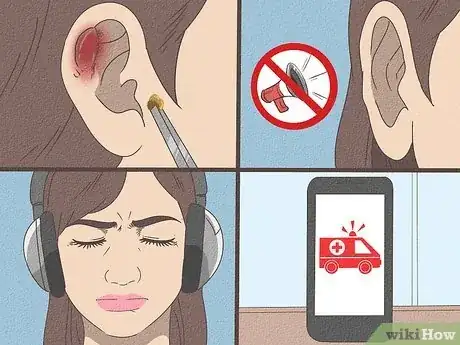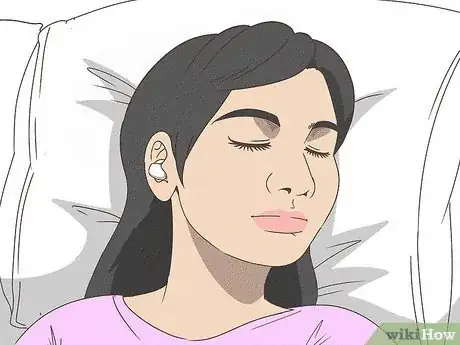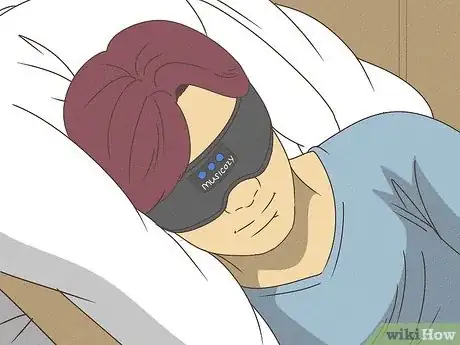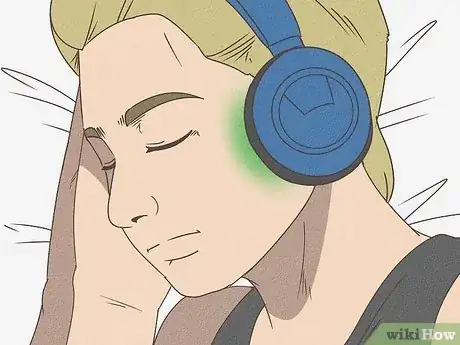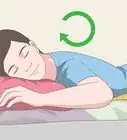This article was co-authored by Alex Dimitriu, MD and by wikiHow staff writer, Nihal Shetty. Alex Dimitriu, MD is the Owner of Menlo Park Psychiatry and Sleep Medicine, a clinic based in the San Francisco Bay Area with expertise in psychiatry, sleep, and transformational therapy. Alex earned his Doctor of Medicine from Stony Brook University in 2005 and graduated from the Stanford University School of Medicine's Sleep Medicine Residency Program in 2010. Professionally, Alex has dual board certification in psychiatry and sleep medicine.
There are 8 references cited in this article, which can be found at the bottom of the page.
This article has been viewed 24,555 times.
Sleeping with headphones is something many people do every night, and for good reason. Listening to music can give us a better night’s sleep, and using headphones keeps you from disturbing other people with an external speaker. But is sleeping with headphones safe? Generally, yes. But it's important to follow safety precautions. Our complete guide will show you how to use headphones at night safely, give you in-depth reviews for all of our top headphone picks, and look at the benefits of sleeping with headphones.
Steps
Is sleeping with headphones safe?
-
For the most part, yes, but there are some risks to be aware of. While all these risks can be managed by using properly-fitting headphones and keeping the volume at a moderate level, it’s a good idea to be aware of them. If you want to take a break from using headphones while sleeping and you’re not worried about disturbing other people, you can always use an external speaker. Some potential problems from sleeping with headphones include:
- Earwax build-up: Earbuds block the natural movement of wax outside the ear, so it’s best not to wear them too long, or wear over-the-ear headphones if you’re concerned about this.[1] X Research source
- Hearing loss: Listening to loud music for prolonged periods of time can damage your hearing. Try to limit your volume to 60% of its maximum to prevent hearing loss.[2] X Research source
- Pressure headaches: Some people may experience headaches with tight-fitting headphones that place pressure on their skull. Using a more comfortable pair can limit these symptoms.[3] X Trustworthy Source PubMed Central Journal archive from the U.S. National Institutes of Health Go to source
- Necrosis: Ill-fitting headphones can damage the skin in your ear canal over time, which happens when there’s not enough blood flow to keep cells alive. Looser headphones can prevent this from happening.[4] X Trustworthy Source Cleveland Clinic Educational website from one of the world's leading hospitals Go to source
- Missing emergencies: Noise-cancelling headphones can keep you from hearing important calls, alarms, or warnings about emergencies.[5] X Research source
Best Picks for Sleep-Friendly Headphones
-
We’ve done the research: here are our top picks for products that will get you a good night’s rest while listening to your favorite tunes.
- Best headband headphones: HoomBand Wireless
- Best budget headband headphones: MUSICOZY Sleep Headphones
- Best low-profile earbuds: &tag=wikihow13114711-20 Damipow True Wireless Sleep Earbuds
- Best budget low-profile earbuds: Hearprotek Sleep Earbuds
- Best pillow: M.B. Leaf Pillow with Ear Hole
Best Headband Headphones
-
HoomBand Wireless While normal headphones can be uncomfortable or end up damaged by sleeping on them, headband headphones are specially designed to withstand this pressure. The HoomBand Wireless headband is our top pick because, on top of an exceptionally comfortable design, it also offers a bundle of extra benefits, including access to hypnotic sleep content crafted by experts to help you fight off insomnia. With 10 hours of playtime, a single charge can last you all night.
- Cons: Sizing can be an issue, so be sure to measure the circumference of your head before you buy.
Best Budget Headband Headphones
-
MUSICOZY Sleep Headphones For a more affordable headband headphone that doesn’t sacrifice comfort, our pick goes to MUSICOZY Sleep Headphones. These headphones will last on a full charge for 10 hours, and come with impressive sound quality. They also come in several different colors, so you can pick a style that works best for you.
- Cons: While the padding on the ears doesn’t protrude too much, these headphones might be a bit uncomfortable for dedicated side-sleepers who wake up easily.
Best Low-Profile Earbuds
-
Damipow True Wireless Sleep Earbuds Earbuds that stick out of your ear can make side-sleeping quite uncomfortable. The &tag=wikihow13114711-20 Damipow True Wireless Sleep Earbuds solve this issue by fitting close to your ear, and come with several different sizes for earbud caps so that you can pick the one that feels best. These earbuds are totally wireless, which means you won’t be fussing with cords in your sleep, block outside noise, and have great sound quality.
- Cons: These earbuds only have a battery life of around 5 hours. Although charging them is easy (only taking a couple hours at most), they likely won’t last the whole night without getting plugged in.
Best Budget Low-Profile Earbuds
-
Hearprotek Sleep Earbuds. The Hearprotek Sleep Earbuds do a great job of blocking out noise and are designed to be comfortable even when sleeping on your side. Best of all, they do it without breaking the bank. Since they’re made out of silicone (not plastic), they’re soft and don’t end up digging into your ear.
- Cons: These are wired earbuds, which means that you might end up getting your sleep interrupted by cords. On the plus side, this means that they won’t run out of battery.
Best Pillow
-
M.B. Leaf Pillow with Ear Hole For side sleepers, there’s nothing worse than having a headphone or earbud jut into your ear when you’re trying to relax. The M.B. Leaf Pillow with Ear Hole is designed for people who are dealing with ear pain, whether from headphones, a piercing, or tinnitus. It’s made out of high-density memory foam and comes with specially designed pillow cases.
- Cons: Memory foam pillows are known for their comfort, but this high-density type can be a bit too hard for some sleepers. If you enjoy firm pillows, don’t hesitate to check this one out.
What are the benefits of sleeping with headphones?
-
1Calmer sleep: There have been several studies on the effect of music on sleep that show that listening to music that relaxes you can lead you to feel more well-rested. If you’re experiencing insomnia, listening to music may be able to help you fall and stay asleep.[6] X Trustworthy Source PubMed Central Journal archive from the U.S. National Institutes of Health Go to source
- Listening to music that mimics your heart rate, somewhere between 60-80 beats per minute, can be especially calming. Calculate the BPM of your favorite songs to make a relaxing bedtime playlist.
-
2Improved mood: Listening to music or a podcast you enjoy stimulates the production of serotonin, a chemical that makes you feel good. For people who experience depression, listening to music as you sleep can help your mood at night.[7] X Trustworthy Source PubMed Central Journal archive from the U.S. National Institutes of Health Go to source
-
3Tinnitus relief: If you’re someone who experiences tinnitus, or a constant buzzing or ringing sound in your ears, listing to music or a podcast at night can give you some relief. There are also specialized music therapies that remove certain irritating frequencies from sound, which can also help alleviate your symptoms.[8] X Trustworthy Source PubMed Central Journal archive from the U.S. National Institutes of Health Go to source
- If your tinnitus is caused by prolonged exposure to high-intensity noise, be sure to talk to your doctor before deciding to sleep with headphones. You may end up irritating your ears further.
- If you’re interested in music therapy for tinnitus, talk to an ENT doctor for more advice.
You Might Also Like
 Sleeping in the Nude: Potential Benefits and How to Get Started
Sleeping in the Nude: Potential Benefits and How to Get Started










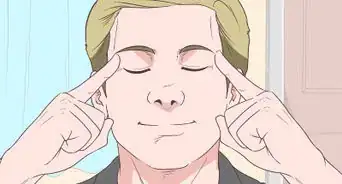


References
- ↑ https://theconversation.com/dont-wear-earphones-all-day-your-ears-need-to-breathe-168742
- ↑ https://kidshealth.org/en/teens/earbuds.html
- ↑ https://pubmed.ncbi.nlm.nih.gov/20499214/
- ↑ https://health.clevelandclinic.org/sleeping-with-headphones/
- ↑ https://www.thetimes.co.uk/article/noise-cancelling-headphones-keep-an-ear-out-for-danger-p35h578jf
- ↑ https://pubmed.ncbi.nlm.nih.gov/22494532/
- ↑ https://pubmed.ncbi.nlm.nih.gov/29144545/
- ↑ https://www.ncbi.nlm.nih.gov/pmc/articles/PMC3731192/
About This Article

